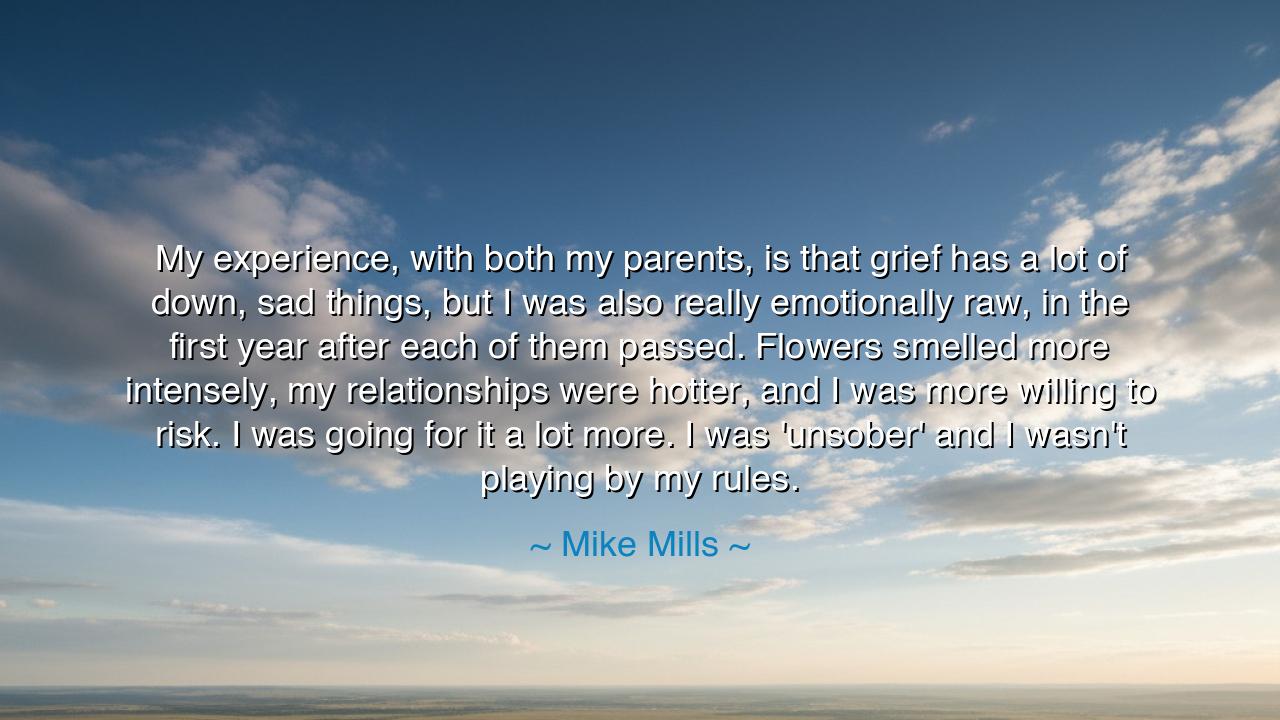
My experience, with both my parents, is that grief has a lot of
My experience, with both my parents, is that grief has a lot of down, sad things, but I was also really emotionally raw, in the first year after each of them passed. Flowers smelled more intensely, my relationships were hotter, and I was more willing to risk. I was going for it a lot more. I was 'unsober' and I wasn't playing by my rules.






Hear the words of Mike Mills, spoken with a depth born from loss: “My experience, with both my parents, is that grief has a lot of down, sad things, but I was also really emotionally raw, in the first year after each of them passed. Flowers smelled more intensely, my relationships were hotter, and I was more willing to risk. I was going for it a lot more. I was ‘unsober’ and I wasn’t playing by my rules.” These words reveal the strange dual nature of grief: that in its sorrow, it also sharpens life, stripping away illusions and leaving only what is vivid and true.
To lose one’s parents is to be thrust into the heart of mortality. Mills speaks of the pain—the sad things that weigh upon the heart—but he also testifies to the paradox of grief: that in the face of death, the living sometimes become more awake. The ordinary world changes; flowers smell richer, love burns brighter, risks seem less terrifying. For when the permanence of life is broken, one feels time as fleeting, and in that fleetingness lies a fierce urgency to live fully.
The ancients knew this truth. In the Epic of Gilgamesh, when the mighty king lost his friend Enkidu, his sorrow was bottomless, yet it drove him to seek wisdom, to look beyond comfort, to risk the unknown. Out of his grief came vision, and out of his rawness came transformation. Mills speaks in the same tradition: that grief, though crushing, can also ignite a kind of reckless clarity, where the soul discards hesitation and seeks what matters most.
History, too, offers witness. Consider Joan Didion, who in The Year of Magical Thinking chronicled the death of her husband. Her pain was unbearable, but her writing revealed the sharpened vision of one stripped bare by loss. She wrote of the heightened senses, the altered reality, the willingness to stare unflinchingly at truths once avoided. Mills describes the same state—what he calls “unsober”—a departure from the ordinary rules, where grief’s fire burns away pretense and leaves behind raw truth.
From this emerges a lesson: grief is not only sorrow, but revelation. It strips life down to its essentials, reminding us of what is fleeting and what endures. It teaches us that love, beauty, and connection are more precious because they are temporary. The risks we avoid in comfort suddenly seem trivial when set beside the reality of death. To live “by the rules” is to live cautiously; grief dares us to step beyond caution and seize the intensity of the present moment.
The practical wisdom is thus: when grief comes, do not fear its rawness. Let it teach you. Let it heighten your senses, deepen your love, and free you from unnecessary restraint. Allow it to remind you that every breath is fragile and therefore sacred. Do not waste this clarity by retreating into numbness; instead, as Mills did, allow yourself to “go for it,” to live more honestly, more fiercely, more awake.
So let us take Mike Mills’s words as both comfort and challenge. Grief will come to every soul, and it will bring with it sadness beyond words. Yet hidden in its fire is also a gift: a chance to feel more deeply, to risk more boldly, to awaken to the vividness of life. Do not squander this strange gift. For in grief’s rawness lies the reminder that we are alive, and while we are alive, we must love greatly, risk bravely, and honor each moment as if it were our last.






AAdministratorAdministrator
Welcome, honored guests. Please leave a comment, we will respond soon